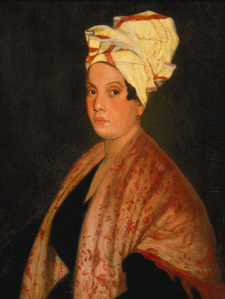 Probably I need to start today’s post by explaining a little bit about Voodoo in nineteenth century Louisiana. Voodoo is a religion that was born among African slaves. They brought from their homeland a tribal religion rooted in spirit and ancestor worship. They also brought a knowledge of herbal medicines and poisons and the practice of making charms and amulets, called gris-gris, which had the power to protect or to bring harm. When they arrived in the United States they were baptised as Roman Catholics. They began to draw parallels between their African religion and the mystical side of Catholicism. The two merged to become Voodoo. Women were very powerful in this faith. A Voodoo queen had a leading rôle at ceremonial meetings and ritual dances.
Probably I need to start today’s post by explaining a little bit about Voodoo in nineteenth century Louisiana. Voodoo is a religion that was born among African slaves. They brought from their homeland a tribal religion rooted in spirit and ancestor worship. They also brought a knowledge of herbal medicines and poisons and the practice of making charms and amulets, called gris-gris, which had the power to protect or to bring harm. When they arrived in the United States they were baptised as Roman Catholics. They began to draw parallels between their African religion and the mystical side of Catholicism. The two merged to become Voodoo. Women were very powerful in this faith. A Voodoo queen had a leading rôle at ceremonial meetings and ritual dances.
So, today I am celebrating the birthday of Marie Laveau, Voodoo Queen, who was born a free person of colour in New Orleans in either 1794 or 1801. It depends which records you look at. When looking at her life it is hard to distinguish fact from fiction. This is partly because she had a daughter of the same name and their stories are somewhat intertwined. Also though, there are two sides to her life that are really inseparable even though they seem at odds. On one hand she was a devout Catholic, dedicated to helping those less fortunate than herself. On the other she was a powerful practitioner of Voodoo and an enemy to be feared.
In the early nineteenth century thousands of people fled from Haiti to Louisiana following a huge slave revolt which led to the abolition of slavery there. Many of the immigrants were white plantation owners who brought their slaves with them. Some were free people of colour and among them was Jacques Paris who Marie married in 1819. Jacques vanished a year later, perhaps he returned to Haiti. His death certificate was filed five years later but there is no record of his burial.
Now known as the Widow Paris, it seems that she began to work as a hairdresser in the homes of wealthy white and Creole women. She probably catered for their husbands too in a brothel called Maison Blanche by Lake Pontchartrain. This would have put her in a position to learn all sorts of intimate secrets about people’s personal lives. She would have also been friendly with their servants and slaves. Armed with so much information, whether she possessed any magical knowledge or not, it would have been easy for her to manipulate people and convince others that she had used mystical powers.
The arrival of the Haitian slaves brought a renewed interest in Voodoo and rumours of their rituals spread quickly. There were wild tales of orgies of drinking, dancing and lovemaking. Some feared there would be another revolt, others were fascinated and wanted to be a part of it. Sometimes around a third of the worshippers at these gatherings were white people. In 1817 the New Orleans Municipal Council forbade the ceremonies excepting on Sundays in Congo Square. It was Marie Laveau who led these ceremonies. It was she who had the idea of charging white people to attend and of inviting the police and the press as well as the debauched and the thrill-seekers of New Orleans. She had made Voodoo a financial success. Her flair for business and her knowledge of so many personal secrets combined with her skill at preparing powders and amulets made her the most powerful woman in New Orleans. Some people would pay $1000 for her help to win an election or $10 for a love powder. While she made a lot of money from the rich, their servants she would help for free.
She died in 1881 and her obituaries are full of praise for her kindness and wisdom. She used her knowledge of herbal medicine to nurse many sick people during epidemics of cholera and yellow fever. She also devoted a lot of time and energy to praying with those who had been condemned to death. If she found someone who she believed to be innocent, she would plead for them to be pardoned or to have their sentences commuted. She saved many lives this way.
Her reputation lived long after her death. Many claimed to have seen her in the town after her supposed demise, but these may be confused with stories concerning her daughter who later took on her mother’s rôle. Until quite recently it was possible to visit the grave of Marie Laveau. She might grant a request to a person who drew an X on her tomb, turned around three times, knocked on the tomb and then yelled out their wish. If the wish was granted, they must return and draw a circle around the X and leave her a gift. Acceptable gifts were money, cigars, white rum and candy.
One thought on “Voodoo Queen”